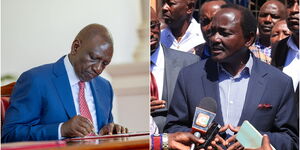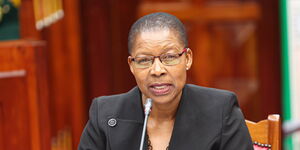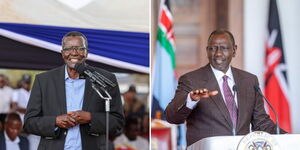Former Citizen TV Managing Editor, Peter Opondo has lifted the lid on a small trick that guaranteed Julie Gichuru's show, Sunday Live, the number one slot in nationwide ratings.
In an opinion piece he authored on Monday, October 3, Opondo explained that the show was handled differently under a new technique known as 'slow journalism.'
At the time, the team behind the then wildly popular show would meet regularly to plan content segments - a process that kept reliance on perishable news items to a minimum.
He further noted that the team would pre-plan up to 90 per cent content for the show weeks in advance, a move that made the show fresh and quite informative.
Some of the show's segments included Consumer Watch, Who Owns Kenya and Kibaki Succession among others.
"A couple of years ago at Citizen TV, I remember we used to pre-produce nearly 90 per cent of the content for the flagship show, Sunday Live, then hosted Julie Gichuru. Products like Consumer Watch, Who Owns Kenya, Kibaki Succession as well as regular news features were mostly produced or at least discussed weeks in advance.
"That news bulletin would carry only two to three stories of the day and viewers voted by giving the show the highest ratings as compared to any other show on TV in Kenya at the time. You could tell that the content was different and rich," he explained.
In a previous interview, Gichuru also relished the diversity and informative nature of her show.
She told Media Online that the show's new design, incorporating human and developmental issues, drew a younger audience that had stopped watching news.
“Sunday Live with Julie Gichuru was an exciting show! I loved the pace and style of delivery – it felt more like a magazine show, and this drew in a wide and varied audience and, especially important, young viewers who had stopped watching news.
"This became our passion. There are so many inspiring stories of change from our coverage – that will always be the highlight for me," she explained.
Opondo criticised the Kenyan media for over-reliance on perishable news items that frustrate journalistic output and is often relegated to the very busy final hour to air or publication.
He argued that slow journalism is financially sound and produces quality output that restores the public's faith in the media.
"The second issue is that if you analyse the news content pages, you will note that stories on events of the day constitute maybe up to 80 per cent of the pages (not factoring in the magazines) in newspapers. The same applies to both radio and TV where save for the occasional one or two preplanned features and special reports, the rest of the stories essentially relay to audiences “what” happened. Call it conveyor-belt journalism, if you like."
"The upshot of this is that journalism is commoditised, there is minimal differentiation and value is eroded. If you conduct a cost-per-story analysis and weigh it against the impact of the same story, you will arrive at the inevitable conclusion that newsrooms today are vast wastelands; investments are being made mostly to gain competitive parity rather than competitive advantage," he added.
Gichuru left Citizen TV in 2015 after hosting the show for seven years to concentrate on her media company, Arimus Media.
At the time, she sought to step out of the limited approach to news of the mainstream media and her editors.
"I wanted to highlight human challenges and development issues, I also wanted to celebrate successes so others can learn from them. I wanted inspirational Africans on air; role models who could inspire viewers to greater things," she explained.












